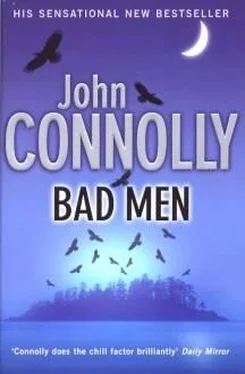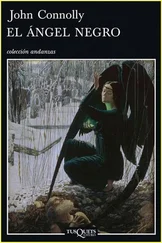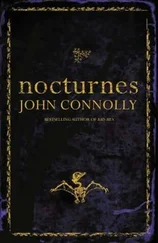But still she shook.
She had tried calling her sister before the boat left, but the phone had only rung. She had called Karen Meyer, with the same result. She knew in her heart that both were dead, that she had cost them their lives. It was her fault, all her fault.
But if she died, then Danny would also die, and it would all have been in vain. There was still a chance for them, if she could get to Danny in time. Thorson had canceled his final sailing, and appealing to his better nature was not an option. She knew his reputation and doubted if he would make even one leg of the journey and risk being stranded in Portland. Even if he was willing to go to sea, Marianne feared that someone would be watching the ferry in case she tried to escape, certainly from the mainland and possibly from the island itself.
But there were others who might be prepared to take them off the island, if not as far as the mainland, then at least to one of the larger neighboring islands. Carl Lubey had a boat and sometimes made runs if someone was in enough trouble and was prepared to pay him handsomely for it. He was an option, although the idea of being at his mercy was unappealing. Her other option was Jack the painter. He also had a boat, and she knew that he cared for Danny. If he was sober, he was their best chance.
There were lights to her right and left: the houses on nearby islands, their windows hanging suspended in the darkness like fissures in the fabric of the night or the promise of new worlds. She fantasized about taking Danny and disappearing through one of them, sewing it closed behind her so that nobody could ever find them again. The lights disappeared as the snow thickened and the wind picked up. The little boat tossed on the waves and she held tightly to the ropes, spray drenching her face and chilling her hands. She wore the boatman’s spare oilskins, but water was still finding its way through. She thought of her son, and she thought too of Joe Dupree. She could turn to him, but the risks were too great. She would be forced to reveal the truth about herself and she couldn’t do that.
But there was another reason that she was unwilling to ask him for help. She had seen Willard, and knew that Moloch must be close by. There would be others too, perhaps not as bad as her husband and the pretty, dangerous boy-man, but bad enough.
Joe Dupree was not strong enough to stand against them.
If she turned to him for help, they would kill him.
They would kill them all.
Dupree stood at the station house door and watched the snow fall. Already, Island Avenue was empty. The stores had closed early and the Rudder and Good Eats would not be opening for business. The ferry would return to port any minute now and Thorson would kill the lights on the dock and hang out a “Sailing Canceled” sign. The snow was already sticking to the sidewalks, the shadows of the flakes made huge by the glow of the streetlights as they descended. No cars were moving anywhere on the island. The risks of ending up in a ditch or, worse, taking a tumble into the cold sea were too great.
He heard footsteps behind him. Macy was wrapped up warm. She had added an extra sweater to her uniform, and her hands were double wrapped in a pair of woolen gloves and a leather pair from the station locker.
“No luck,” she said. She had been trying to raise Portland on the radio for the last hour, but there was only static. The phone line, meanwhile, had exchanged a dial tone for a steady hum. Dupree had wandered over to check with Larry Amerling in his house behind the post office, but his phone was also without a proper tone. It looked as if the entire island was going into communication meltdown.
“Did you get out to the Site?” Amerling asked Dupree as the policeman prepared to leave.
“Yes, I went out there.”
“And?”
“There were moths. A lot of moths.”
“That’s all?”
Dupree debated telling him about the vibrations in the ground, then decided against it. The postmaster looked edgy enough as things stood.
“That’s all, and after this snow I don’t think we’ll be seeing too many more moths on the island until the summer. Stay warm, Larry. I’ll check in with you at the post office tomorrow morning.”
He left the postmaster, pulling the front door closed behind him. A moment or two later, he heard the sound of the dead bolts locking.
Now, beside him, he saw Macy trying to dial a cell phone number. The display showed a ringing phone symbol, indicating that it was attempting to make a connection, then returned to the Verizon home screen. The aerial strength indicator read virtually nil. Even the reception on the TV in the rec room was terrible.
“Guess we batten down the hatches,” she said.
“Guess so.”
He didn’t even look at her.
Quiet time, she thought. I can do quiet time. I just wish you’d close the damn door.
Macy’s day had been spent on largely mundane matters. There was the B &E that turned out to be nothing more than an embarrassed husband who had climbed in through the kitchen window while dead drunk the previous night, broken plates, and knocked over the portable TV in the kitchen, then fallen asleep in the spare room because he was afraid of waking his wife, unaware that she had popped enough sleeping pills to allow half of San Francisco to sleep through an earthquake. His wife had eventually come to, spotted the damage, and called the cops. The first her husband knew about it all was when Macy arrived at their door while he was throwing up in the john. The woman began hollering at her husband and calling him ten types of asshole while he just held his head in pain and shame.
Macy left them to it.
Apart from the happy couple, she had issued a warning to the owners of a scrawny mongrel dog that was trying to bite passing cars, and talked to a couple of kids who were smoking and probably drinking (they’d hidden the beer cans somewhere in the undergrowth, but Macy was damned if she was going to go beating the bushes with a stick for a couple of Miller High Lifes) out by the old gun emplacement. She’d taken their names, then told them to haul their asses back home. One girl, dressed in a black leather motorcycle jacket and combat pants, with a Korn T-shirt underneath and a spiked dog collar around her neck, hung back.
“Are you going to tell my mom and dad?” she asked Macy. The girl’s name, according to her driver’s license, was Mandy Papkee.
“I don’t know. You got any reason why I shouldn’t?”
“We weren’t doing any harm. We just came out here to remember Wayne and Sylvie.”
Macy knew about the accident on the island the week before. A lot of the people she had met that day insisted on talking about it, if only to assure her that things like that didn’t happen very often on Dutch. Sometimes, the older ones said “on Sanctuary,” reinforcing the seemingly dual nature of the island’s existence.
“You knew them?”
“Everybody knows everyone else out here,” said Mandy. “I mean, duh, it’s an island.”
“Duh?” repeated Macy, pointedly.
“Sorry,” said Mandy. “Look, we’re not going to be back out here, not for a long time. I can promise that.”
“Why?”
“Because it gives us the creeps. This was, like, a stupid dare. We shouldn’t have come here. It just feels wrong.”
“Because of what happened to your friends?”
“Maybe.”
Mandy clearly didn’t want to say anything more, but she looked around at the trees, as if half expecting Sylvie and Wayne to emerge bloodied from the undergrowth, looking for a beer and a toke.
“Look, just give us a break, okay?”
Macy relented. “Okay,” she said, and watched Mandy follow her friends back to the road. Something flitted across the grass toward Macy’s feet. It was a moth, an ugly gray one. Macy flicked her foot at it and the moth flew away. She strolled over to the damaged tree against which the stolen car had finally come to rest and saw the little shrine that had been raised in memory of the dead teenagers. She touched nothing. By the time she got back to the Explorer, Mandy and the other kids were gone.
Читать дальше












